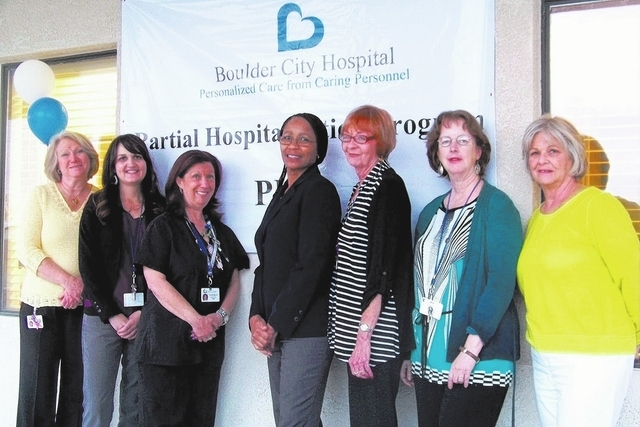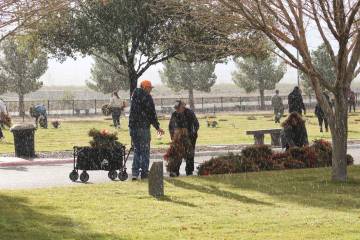Psychiatric treatment center holds open house
The new home of Boulder City Hospital’s Partial Hospitalization Program at 999 Adams Blvd. was officially christened with an open house Nov. 12.
The program has been providing psychiatric treatment for the Las Vegas area since 1995 when the adult, intensive outpatient clinic began under the direction of local psychologist Brent Dennis.
Dennis and Sue Berg, the program’s first secretary who was hired by Dennis and manages his local practice, were present at the well-attended gathering.
Although other partial hospitalization programs serve the area, PHP is the only one of its kind in Nevada, according to a statement made by Boulder City Hospital CEO Tom Maher in an Oct. 31 Boulder City Review story.
Those who provided comments during the open house agreed that the program is unique and the new PHP location is a cut above the previous site within Boulder City Hospital. It provides “less of a hospital setting” and “clients had no trouble adjusting” to the new surroundings, according to Laura Lynch, a clinical social worker in PHP.
Marly Henry, PHP manager and licensed clinical social worker, said the new setting is “less institutionalized” and clients are able to eat lunch outside with a view of the intersection of Adams and Buchanan boulevards.
Henry said if anyone had reservations about PHP clients receiving psychiatric treatment, this should be considered: “We have been here for 15 years and (the community) never heard a peep out of us.”
A 50-year Boulder City resident who was a guest at the event confirmed Henry’s statement and said she never knew the program existed within the hospital.
Cathleen Koon, PHP’s intake coordinator and a registered nurse, board certified in psychology, has been with the program for 15 years. She said her work is a passion for her and she continues with the program because of what she receives from the clients.
“They make me appreciate getting up every morning because when I look at the challenges they deal with, it makes mine look so small. They are eager, they’re motivated; they work hard to survive, to live,” Koon said.
Clients enter the program for a variety of reasons that are as unique and varied as they are, according to Koon.
Yet PHP clients do have a diagnosis of a “serious mental illness,” Lynch said.
Each day clients are picked up from their residences and taken to the hospital. How long a person remains in the program depends upon their progress, Lynch said, noting the average treatment is four to eight months.
Client services include group, individual and cognitive therapy sessions, an addictive behavior group session, medication monitoring, nursing care, familiarization with community resources, symptom recognition and discharge planning.
Lynch said it is in group therapy where, among many other concerns, “clients learn about their symptoms” and “developing self-awareness,” as well as understanding “how to put depression into perspective.”
PHP also serves as a training program for University of Nevada, Las Vegas social work students and other similar partial hospitalization programs, Lynch said.
On occasion, patients from the hospital’s long-term care unit are served by the Partial Hospitalization Program.
Even with its improved, more comfortable setting, which is especially important for some clients, Koon said, “a lot of our folks may not ever be able to take care of themselves” and will continue to live in group homes and need supportive services.
“What the goal is for them,” Koon said, is “somewhere inside.” They need “to have a sense of accomplishment, to have a sense of security, something about them that makes them feel good.” This is the “very intangible goal” of the PHP staff of nine professionals.
Dennis, who works with PHP clients, said the program “is as strong as ever.” He’s seen a number of partial hospitalization programs in the Las Vegas Valley come and go and attributes PHP’s longevity to the facts that it meets the community’s needs, has a strong network of referrals from other institutions and has a commitment from the hospital to maintain the program and help it survive.
Dennis said he thought PHP is “only going to get better” with the Affordable Care Act.













